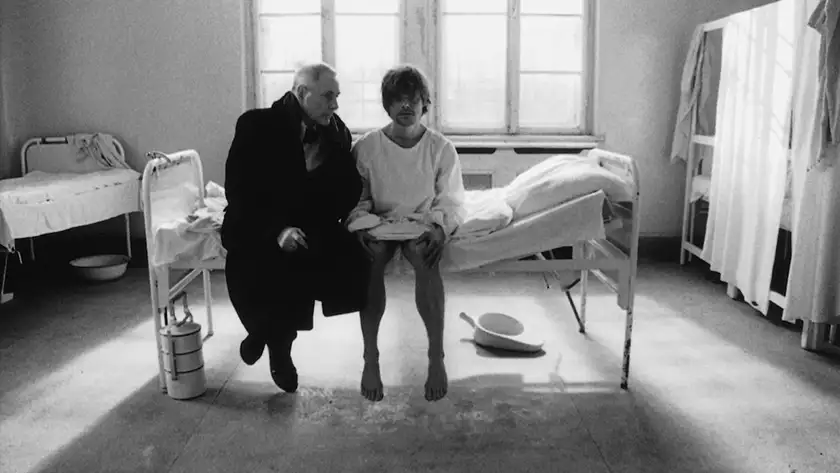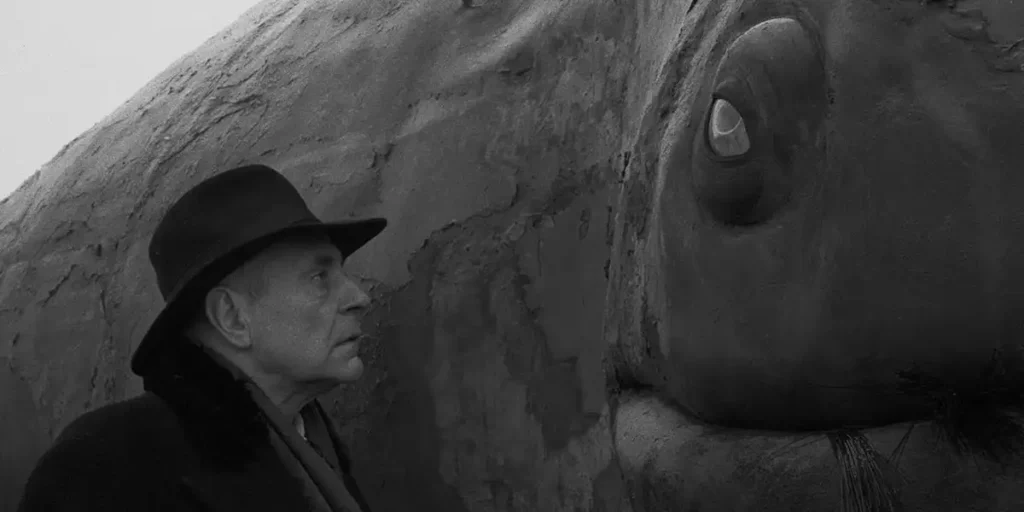Re-released as part of Curzon’s upcoming Béla Tarr season, Werckmeister Harmonies is a haunting, unforgettable film about the inevitability of a social apocalypse.
Directors: Béla Tarr & Ágnes Hranitzky
Genre: Drama, Mystery
Run Time: 145′
Year of Release: 2000
UK & EIRE 4K Restoration Re-release: August 2, 2024
Where to watch: Re-release at BFI Southbank & select cinemas; film on digital, VOD & DVD/Blu-Ray
Werckmeister Harmonies, Béla Tarr and Ágnes Hranitzky’s monumental turn of the millennium masterpiece, starts as it means to go: via close-up, we see a small fire burning in a bar before it is doused by liquid. Instantly, light and warmth are extinguished, replaced by darkness and cold. This might be simple symbolism, but it is no less effective. The night is over and the bar owner orders the male drunkards to leave, but not before main character and young newspaper delivery man János (Lars Rudolph) conducts the other men in a performance about a total eclipse of the sun.
A lofty script, a combination of surrealism and comedy, and Mihály Vig’s haunting music ensure Werckmeister Harmonies has an unforgettable start. From there, this masterpiece only continues to reach new heights.
János’ initial monologue, captured via flowing camerawork by Tarr, Hranitzky, and Rob Tregenza (one of seven DOPs who worked on Werckmeister Harmonies) sets things up fascinatingly. There is pessimism and nihilism sprinkled with moments of hope and peace, and the intense realism runs alongside surrealism and, perhaps surprisingly, comedy. Tarr, who collaborated on the screenplay with novelist László Krasznahorkai, balances these elements superbly; watching a group of men stagger around acting as the moon or the sun is amusing, but simultaneously János is delivering a depressing and meaty monologue about the futility of existence. Such dry comedy is seen again not just later in Werckmeister Harmonies, but in some of Tarr’s other films too.
The men live in a desolate small town in Hungary. It is unnamed and the historical period is never confirmed, but it is likely to be set during the Communist era of Hungary, a time of repression that Tarr also revisits in other films such as Sátántangó (1994). Werckmeister Harmonies follows János around this small town, as he visits his uncles György (Peter Fitz) and Lajos (Alfréd Járai) and sees the new circus, which consists of a large stuffed whale and the mysterious “Prince”. The narrative is focussed and finely tuned, and whilst it is told slowly, it is far from the elongated atmosphere of Sátántangó (1994).
In a career of impressive films, Werckmeister Harmonies is the best example that showcases Tarr’s incredible control of pace. Assisted by his co-director Hranitzky, the Hungarian auteur knows exactly when to elongate or shorten scenes (although none are ever that short) and when to utilise noise or silence. A scene of two young boys banging drums and metal lids becomes excruciating to witness, for example, amplifying the violent nature of their actions and foreshadowing what comes next.

Tarr’s ‘slow cinema’ style works in full force throughout Werckmeister Harmonies; camera movements are languid but exceptionally well controlled. One early tracking shot that sees János walk down a dim street for a long period of time showcases Tarr’s exceptional ability in choosing how long to hold a shot for. As it continues, the light from the streetlamps begins to abandon János; the camera itself, which shoots from in front of the man, eventually becomes submerged into the darkness just as he does. Without this lengthy and extended camerawork, such symbolism wouldn’t be possible, or it at least would diminish.
Werckmeister Harmonies is, as many of Tarr’s films are, pessimistic about humanity, but in comparison to others such as Sátántangó or The Turin Horse (2011), there are brighter, albeit brief, moments of hope. It makes the depressing conclusion even more crushing, and Tarr’s anger at the abuse of power by politicians and parties, both historically and contemporarily, positively screams in a late hospital scene. It is a ferociously political moment in a frequently abstract film, the camera—essentially János’ viewpoint—a floating, almost reluctant observer of such violence. It is quite possibly the crowning moment of Tarr’s filmography.
This scene, and the film overall, are enhanced by Rudolph’s miraculous performance of wide-eyed innocence and naivety, which slowly dies as he learns about the violence of humanity. Despite the obvious political and religious themes that are tackled in Werckmeister Harmonies, a certain surrealism and abstractness remains. As with many of Tarr’s other films, questions are never easily answered, and in many cases, just like in life, they remain unanswerable. Tarr is simply painting and mirroring our world and all its complexities, simplicities, cruelties, beauties, and even its strange humour.
A new 4K re-release of Werckmeister Harmonies, curated by Curzon and the BFI, will be screened at the BFI Southbank and in select UK and irish cinemas from August 2, 2024. The BFI will host the complete retrospective at the BFI Southbank as part of their Béla Tarr season. Read our review of Béla Tarr’s Damnation!

